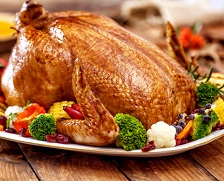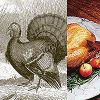
- In Monthly Featured Articles
- Posted November 01, 2016
Diabetes Food Spotlight: Turkey
Turkey's glycemic index and glycemic load values are low, so eating it in moderation is unlikely to disrupt your immediate blood sugar control
Related Topics
With Thanksgiving and its leftovers looming, you may be wondering, how is all that turkey going to affect my diabetes? Fortunately, turkey, like all meat, is high in protein and has virtually no carbohydrates. That means its glycemic index and glycemic load values are low, so eating a reasonable portion of turkey, around 3 to 4 ounces, is unlikely to disrupt your immediate blood sugar control.
Turkey is a good source of vitamin B2 (riboflavin) and B12 (cobalamin), and an excellent source of B3 (niacin) and B6 (pyridoxine), and with the skin removed, its total fat and saturated fat content is reduced by nearly half.
Let’s break it down
Although meat consumption in general has been linked to higher risks of diabetes and its complications, the strongest associations are with red meats (beef, lamb, and pork) and processed meats (like hot dogs and bacon). In fact, when considered alone, unprocessed poultry (chicken and turkey) appears not to increase diabetes risk, and small amounts of poultry are often included in eating patterns considered prudent for diabetes prevention and management. Before you cook it, keep in mind that removing turkey’s skin, marinating it with acids such as lemon juice and vinegar to decrease its pH, and roasting it at a low temperature can all go towards reducing some of its less savory features like saturated fats and advanced glycation end-products (damaged proteins that cause cellular damage and may contribute to insulin resistance).
Choosing white breast meat can also reduce your intake of saturated fat, but since dark thigh meat is higher in certain important nutrients for people with diabetes, including the amino acid taurine, it may have the nutritional advantage.
Everything in moderation
So, during the holidays, instead of turkey hot dogs and lunch meats, enjoy moderate amounts of skinless, slow-roasted turkey meat as part of your overall healthy eating plan. The rest of the year, remember to eat an overall balanced diet, including fish and vegetable proteins like beans, lentils, nuts, and seeds, to limit your intake of lean red meats, and to avoid processed meats.
(Curr Diabetes Rev 2013;9:237–48)
Copyright © 2016 Healthnotes, Inc. All rights reserved. www.healthnotes.com
Learn more about Healthnotes, the company.
Search
Recent Articles
-
Eat a Variety of Snacks to Stay Satisfied
March 01, 2017 / Monthly Featured ArticlesBy Maureen Williams, ND People feel more satisfied after eating healthy foods like nuts and are les…
-
Herbal Defense Against the Common Cold
March 01, 2017 / Monthly Featured ArticlesBy Maureen Williams, ND Larch arabinogalactan increased the body’s potential to defend against infe…
-
Don’t Let Hay Fever Spoil Your Child’s Spring Fever
March 01, 2017 / Monthly Featured ArticlesBy Linda Knittel, MA Support your child’s comfort with a holistic approach that addresses lifestyle…

























